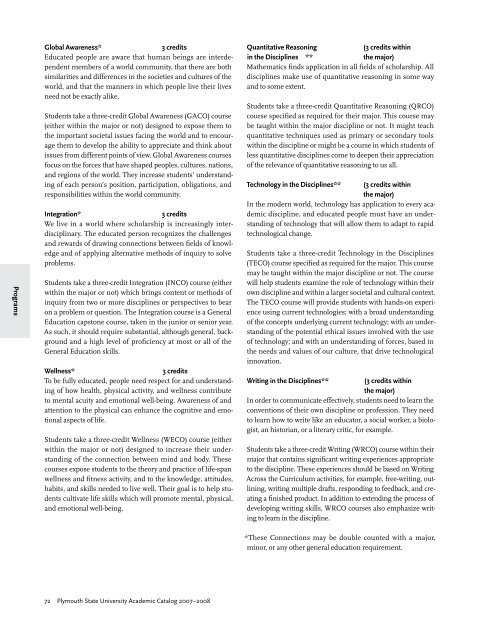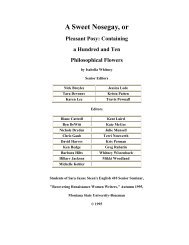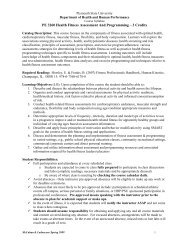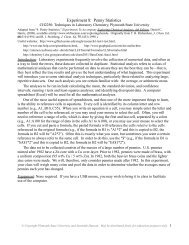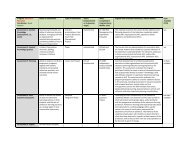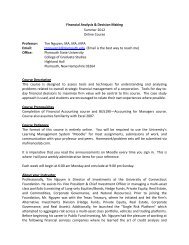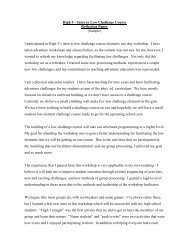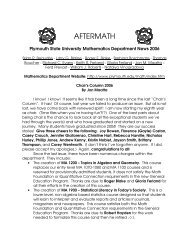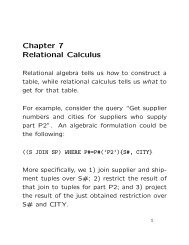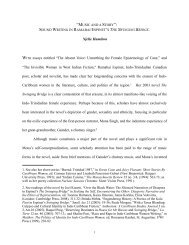2007-2008 Undergraduate Academic Catalog - Plymouth State ...
2007-2008 Undergraduate Academic Catalog - Plymouth State ...
2007-2008 Undergraduate Academic Catalog - Plymouth State ...
- No tags were found...
Create successful ePaper yourself
Turn your PDF publications into a flip-book with our unique Google optimized e-Paper software.
ProgramsGlobal Awareness*3 creditsEducated people are aware that human beings are interdependentmembers of a world community, that there are bothsimilarities and differences in the societies and cultures of theworld, and that the manners in which people live their livesneed not be exactly alike.Students take a three-credit Global Awareness (GACO) course(either within the major or not) designed to expose them tothe important societal issues facing the world and to encouragethem to develop the ability to appreciate and think aboutissues from different points of view. Global Awareness coursesfocus on the forces that have shaped peoples, cultures, nations,and regions of the world. They increase students’ understandingof each person’s position, participation, obligations, andresponsibilities within the world community.Integration*3 creditsWe live in a world where scholarship is increasingly interdisciplinary.The educated person recognizes the challengesand rewards of drawing connections between fields of knowledgeand of applying alternative methods of inquiry to solveproblems.Students take a three-credit Integration (INCO) course (eitherwithin the major or not) which brings content or methods ofinquiry from two or more disciplines or perspectives to bearon a problem or question. The Integration course is a GeneralEducation capstone course, taken in the junior or senior year.As such, it should require substantial, although general, backgroundand a high level of proficiency at most or all of theGeneral Education skills.Wellness*3 creditsTo be fully educated, people need respect for and understandingof how health, physical activity, and wellness contributeto mental acuity and emotional well-being. Awareness of andattention to the physical can enhance the cognitive and emotionalaspects of life.Students take a three-credit Wellness (WECO) course (eitherwithin the major or not) designed to increase their understandingof the connection between mind and body. Thesecourses expose students to the theory and practice of life-spanwellness and fitness activity, and to the knowledge, attitudes,habits, and skills needed to live well. Their goal is to help studentscultivate life skills which will promote mental, physical,and emotional well-being.Quantitative Reasoning(3 credits withinin the Disciplines **the major)Mathematics finds application in all fields of scholarship. Alldisciplines make use of quantitative reasoning in some wayand to some extent.Students take a three-credit Quantitative Reasoning (QRCO)course specified as required for their major. This course maybe taught within the major discipline or not. It might teachquantitative techniques used as primary or secondary toolswithin the discipline or might be a course in which students ofless quantitative disciplines come to deepen their appreciationof the relevance of quantitative reasoning to us all.Technology in the Disciplines** (3 credits withinthe major)In the modern world, technology has application to every academicdiscipline, and educated people must have an understandingof technology that will allow them to adapt to rapidtechnological change.Students take a three-credit Technology in the Disciplines(TECO) course specified as required for the major. This coursemay be taught within the major discipline or not. The coursewill help students examine the role of technology within theirown discipline and within a larger societal and cultural context.The TECO course will provide students with hands-on experienceusing current technologies; with a broad understandingof the concepts underlying current technology; with an understandingof the potential ethical issues involved with the useof technology; and with an understanding of forces, based inthe needs and values of our culture, that drive technologicalinnovation.Writing in the Disciplines** (3 credits withinthe major)In order to communicate effectively, students need to learn theconventions of their own discipline or profession. They needto learn how to write like an educator, a social worker, a biologist,an historian, or a literary critic, for example.Students take a three-credit Writing (WRCO) course within theirmajor that contains significant writing experiences appropriateto the discipline. These experiences should be based on WritingAcross the Curriculum activities, for example, free-writing, outlining,writing multiple drafts, responding to feedback, and creatinga finished product. In addition to extending the process ofdeveloping writing skills, WRCO courses also emphasize writingto learn in the discipline.*These Connections may be double counted with a major,minor, or any other general education requirement.72 <strong>Plymouth</strong> <strong>State</strong> University <strong>Academic</strong> <strong>Catalog</strong> <strong>2007</strong>–<strong>2008</strong>


